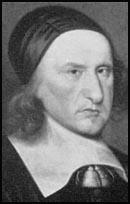Archibald Campbell, Earl of Argyll

Archibald Campbell, the son of the 7th Earl of Argyll, was born in 1598. He was educated at the University of St. Andrews and despite his father's Roman Catholics beliefs, became a Presbyterian.
Argyll inherited his title and the leadership of the Campbell clan in 1638. Later that year he emerged as the leader of the Scots opposed to the religious policies of Charles I.
After negotiating the Treaty of Berwick in 1639 he helped to make the Scottish Parliament an effective political body. Later that year Argyll arranged for his main political opponent, Earl of Montrose, arranged for him to be confined in Edinburgh Castle.
On the outbreak of the Civil War Argyll supported Parliament and the Scots army played an important role in the defeat of the royalist forces at Marston Moor (July, 1644).
In August, 1644, the Earl of Montrose defeated the Covenanters under Lord Elcho at Tippermuir. He then captured Aberdeen (September, 1644) and plundered the countryside. At Inverlochy (February, 1645) his army killed 1,500 Campbells in battle. He achieved further victories at Auldearn (May, 1645) and Alford (June, 1645). Argyll was therefore pleased when Montrose was defeated by David Leslie at Philiphaugh (September, 1645).
Argyll disapproved of the execution of Charles I. This act resulted in Argyll breaking with Oliver Cromwell and soon after Charles II was proclaimed king in Edinburgh.
In July, 1650, the Parliamentary army invaded Scotland. Cromwell's victory at Dunbar in September destroyed Argyll's authority and he was forced into retirement.
On the Restoration Argyll was arrested on the orders of Charles II. Charged with high treason, Archibald Campbell, 8th Earl of Argyll, was executed in 1661.
